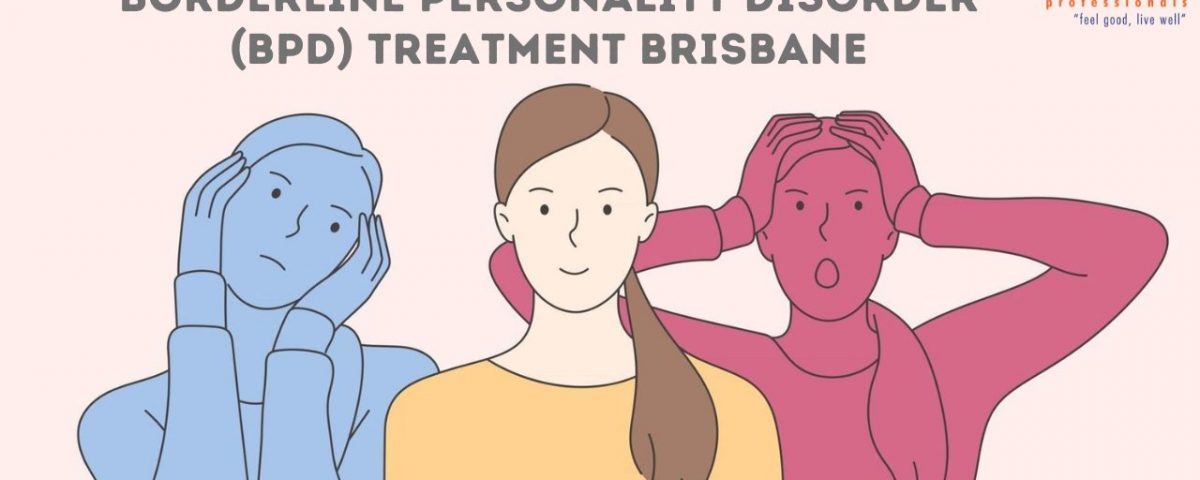Borderline Personality Disorder (BPD) Treatment Brisbane
Do you find your self-image, likes, dislikes and goals change frequently in confusing ways?
You may feel like you are on a rollercoaster – with a waving sense of who you are, and unstable relationships and emotions. If you feel this way, you may have borderline personality disorder (BPD). Individuals with BPD experience nerve ending sensitivity, that is hard to manage once you react. The turbulent emotions of anger and distress can cause chaotic relationships and impulsiveness. Individuals with BPD see the world through a distorted view of themselves, and their environment. BPD can be difficult to understand, however it can be treated. This personality disorder is one of the most common in Australia, affecting around 1 to 4 of every 100 people, at some point in their life. It is important to understand BPD, for the person experiencing it and the people around them.
SYMPTOMS OF BORDERLINE PERSONALITY DISORDER (BPD)
The most common feeling of BPD is uncertainty about identity. As a result, interests and values change rapidly. It affects how you feel about yourself, how you behave and how you relate to others. It also affects how you view relationships. Some days you look up to someone, and the next you look down on them. Do you identify or feel close to any of these statements?
- When I feel insecure in a relationship, I can lash out to keep my other close.
- I can engage in unhealthy actions, such as binge drinking, drugs or spending sprees.
- Most of my relationships are intense, but unstable
- I fear people will leave or abandon me.
- My emotions can shift, and I experience extreme anxiety, anger, or sadness.
- I have feelings of self-loathing and self-hate.
- My actions are impulsive and risky.
- I usually think in black and white.
- I feel cut off from reality.
CAUSES OF BORDERLINE PERSONALITY DISORDER
There is no clear ‘cause’ of BPD. There are factors such as social, family or genetics that play a part. It is understood that a combination of genes and experiences in our lives can be a result for BPD. Common causes for BPD include:
- Disrupted family life.
- Poor communication in childhood.
- Abandonment in childhood or adolescence.
- Traumatic experiences in childhood.
Not everyone with these experiences will develop BPD traits. In some people, a breakup or a stressful event can develop BPD.
HOW TO MANAGE BORDERLINE PERSONALITY DISORDER (BPD)?
BPD isn’t usually diagnosed until after the age of 18. This diagnosis is also difficult, as most individuals lack insight into their thoughts and negative behaviour. If you are dealing with BPD, you can spend time fighting emotions. But accepting your emotions doesn’t mean approving of them. Giving yourself permission to feel the emotions can take some power away from them. There is no shortage of coping skills for managing emotions and stress from BPD! Some easy, and quicker coping skills are detailed below:
- Play Music
- Exercise
- Find Support
- Engage in an Activity
- Sit with your emotions.
- Practice mindfulness
- Breathe, in and out!
These are some of the simpler tips for coping. However, if you wany to learn healthier, and new ways of coping – seeking treatment is very beneficial! You can work through cognitive behavioural therapies such as dialectical behaviour therapy (DBT).
WHERE CAN I FIND HELP FOR BORDERLINE PERSONALITY DISORDER?
Managing BPD can be difficult. Unfortunately, individuals with BPD experience a high risk of suicide and self-harm. Though not every individual with BPD will harm themselves, it is important to seek early help, to know how to manage your toughest times. Our well-informed psychologists at CBT Professionals, can help make a plan to start treatment and recovery. Our Brisbane and Gold Coast offices are home to some highly skilled, knowledgeable, and professional psychologists, that can help provide a safe space and work through your trust issues and introduce some new coping strategies.
Please download our referral form here and take it with you to your GP appointment for preparation of a referral.
Please download our referral form here and take it with you to your GP appointment for preparation of a referral. Contact us now via telephone or online enquiry via www.cbtprofessionals.com.au to book. That first appointment can be the first step to treating your BPD and feeling understood and accepted.
Helensvale: (07) 5551 0251
Mount Gravatt: (07) 3102 1366
Nerang: (07) 5668 3490
If you, or someone you know, require help, please reach out to organisations like Beyond Blue. Additionally reach out to these organisations that may be able to help.
- Lifeline 13 11 14 — for anyone in crisis
- ReachOut (youth mental health service) — online help
- SANE Australia — call 1800 187 263
- Mental Illness Fellowship of Australia (MIFA) — call 1800 985 944
(Health Direct, 2020).
If this is an emergency, please contact 000 or visit your local emergency department.
Disclaimer: Firstly, content on this website is provided for education and information purposes only and is not intended to replace advise from your doctor or registered health professional. Lastly, readers are urged to consult their registered practitioner for diagnosis and treatment for their medical concerns.
REFERENCES
Cleveland Clinic. (2019). Borderline Personality Disorder (BPD). Cleveland Clinic. https://my.clevelandclinic.org/health/diseases/9762-borderline-personality-disorder-bpd
Health Direct. (2022). Borderline personality disorder (DBT). Health Direct. https://www.healthdirect.gov.au/borderline-personality-disorder-bpd
Help Guide. (2020). Borderline Personality Disorder (BPD). HelpGuide. https://www.helpguide.org/articles/mental-disorders/borderline-personality-disorder.htm
Saltees-Pedneault. (2022). Coping Skills for Borderline Personality Disorder. VerywellMind. https://www.verywellmind.com/coping-skills-borderline-personality-disorder-425412
THUMBNAIL: Vadimvector. (2022). https://www.vecteezy.com/vector-art/2445471-young-woman-cartoon-character-with-bipolar-disorder-or-borderline-personality-disorder
THREE CONVENIENT LOCATIONS
MOUNT GRAVATT
Mt Gravatt Medical PrecinctSE 105, 1808 Logan Rd
Upper Mount Gravatt QLD 4122


